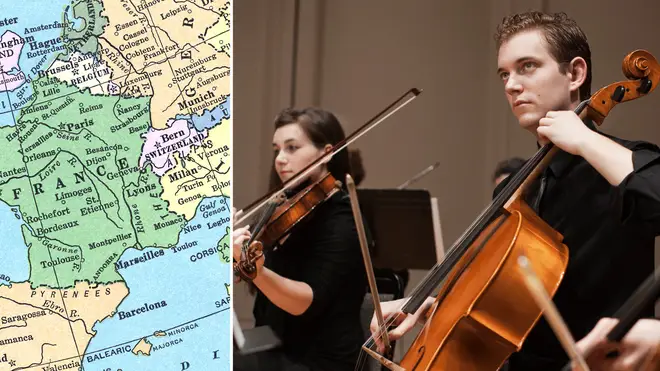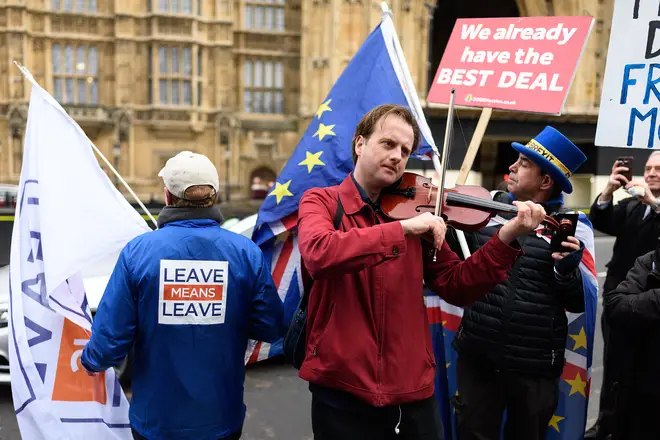On Air Now
Classic FM Breakfast with Dan Walker 6:30am - 9am
26 May 2021, 11:33 | Updated: 26 May 2021, 12:49

Faced with the titanic costs of post-Brexit visas and carnets, UK musicians warn they are being left with no option but to relocate to Europe or quit the music industry altogether.
“It seems a complete nightmare…” one musician said. “As it is, we see no way to recover our pre-Brexit working schedule, making survival very difficult.”
A new joint survey from two major bodies representing UK creative workers, Musicians’ Union and Incorporated Society of Musicians, has revealed the crippling impact of post-Brexit fees, paperwork and visas on musicians.
The survey found 42 percent of musicians are considering moving to Europe in order to continue working, while a fifth (21 percent) are considering a change of career due to the extra costs of touring after Brexit.
MU General Secretary Horace Trubridge warned: “We may lose a large chunk of the talent that underpins our £5.8bn industry.
“The damage done to the UK music industry if the government does not act is immeasurable.”
A government spokesperson said: “We are continuing to work closely with countries across the EU to see what further support we can provide for the sector.”
Read more: ‘Era of being a UK-based concert artist is pretty much over’

One musician in the survey warned they have already run up £40,000 in touring expenses.
Now when working in many EU countries, musicians are required to have a work permit and visa, as well as customs documents like carnets for their equipment.
Transport expenses have also risen due to new road haulage requirements. Some survey respondents said that they expect the combined costs to add up to as much as £15,000 extra per tour.
“The PM needs to step in and sort this mess out now just like he promised when questioned in the House some weeks ago,” Trubridge warned.
In March, Prime Minister Boris Johnson gave evidence to MPs and said the government was working “flat out” to find a solution to mobility issues for musicians. But one month after the promise was made, industry groups described the PM’s promise a “sham”.
In April, Trubridge said: “Our patience is wearing thin, and we have seen no signs whatsoever that ‘ministers are working flat out to fix the problem’.”
Read more: Post-Brexit touring ‘prohibitively expensive’ for musicians, says Lords report

Let Music Live protest on London's Parliament Square
Several musicians surveyed said being a UK citizen is putting them at a professional disadvantage next to their EU colleagues, with one respondent warning: “European employers are asking for EU Passport holders only already”.
A previous survey by the ISM even found many European promoters “do now want to book UK artists as it will involve too much paperwork and expense”.
Another respondent told the MU: “Brexit seems insurmountable to my previous European life as a musician.”
More than three-quarters (77 percent) of those surveyed said they expect their earnings in Europe to decrease once COVID-19 restrictions are lifted, due to the extra documentation needed.
Classical musicians including pianist Joseph Middleton and organist Anna Lapwood have warned that until now, the pandemic has been “masking” the full impact of Brexit on performers.

Anna Lapwood talks to Julian Lloyd Webber for his new Classic FM show 'Rising Stars'
One respondent warned the new process is a “disaster” for the UK creative industries, which generate £111bn a year for the economy.
In April, hundreds of arts organisations including London Symphony Orchestra, Royal Opera House and English National Ballet joined the ISM in signing a letter to the Prime Minister, proposing a cultural visa waiver, emergency funding and bilateral agreements with individual member states.
These agreements would mean countries like Spain and Germany, which currently demand a work permit from UK musicians if they want to be paid for performances, would offer cultural exemptions.
ISM chief executive Deborah Annetts said: “It is time to move beyond partisan politics and develop effective solutions before even more performers move to the EU or change career.
“Musicians are cultural ambassadors for the UK around the world and make an enormous contribution to the nation’s health, economy and global reputation.”
In response to the survey, a UK government spokesperson told Classic FM: “We’ve always been clear that the end of freedom of movement would have implications for professional mobility.
“However, short-term, temporary visits for paid performances by UK musicians are possible in at least 17 EU countries, including France, Germany and the Netherlands, without needing visas or work permits. Specific requirements vary from country to country and it’s important to check Member States’ rules before travelling.
“Alongside new guidance for musicians, we are continuing to work closely with countries across the EU to see what further support we can provide for the sector.”